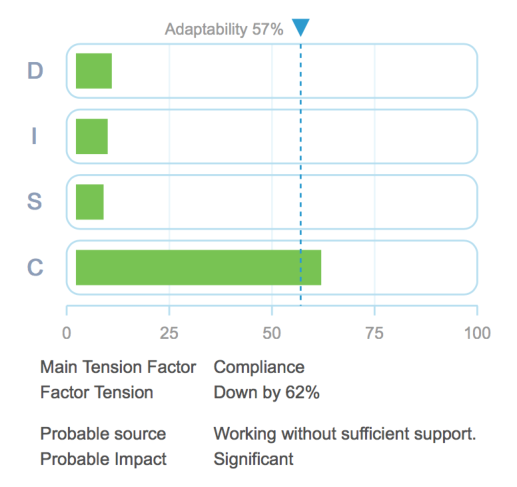Your regular update of news and articles from the world of DISC personality profiling with the Discus solution.

Published: Tuesday 9 January 2024

An example of a Discus Profile Tension display
Inside each full Discus personality report, you'll find a relatively brief section entitled Profile Tension. The purpose of this section is to highlight any major differences between the profile factors in a candidate's results, and to help you understand what those changes might mean in practice.
Specifically, the Profile Tension values shown relate to the differences between the Internal and External Profiles - in other words, they describe the extent to which a candidate feels the need to adapt their behaviour to their current situation. Profile Tension is shown separately for each of the four DISC factors, so it's easy to see where any major adaptations are taking place.
The example shown here illustrates how Profile Tension works. This is from a report for a fictional candidate with a naturally high Compliance, but who is showing a significant fall in that factor within their working environment. The implication is that this person is lacking the support and structure that a Compliant type will prefer, and is therefore feeling the need to act in a much more independent and self-reliant way.
In general, highly Compliant individuals are not comfortable working in environments like this - they prefer to feel sure of their position and able to confirm their actions with others. So, this example might indicate the need to investigate how the candidate relates to the needs of their role, perhaps helping them by clarifying or restructuring the way they work.
To make sense of the Profile Tension results, we need to take account of the fact that tension like this has different effects on different types of personality. Some people find it extremely difficult to adjust their approach to new circumstances, while others thrive on the opportunity.
Discus helps to identify each individual's personal threshold by defining an 'Adaptability' level. The higher this Adaptability, the more able a person is to modify their approach, and the less significant its effects are likely to be. People with high Adaptability can often fit easily into entirely new patterns of behaviour, while those with low Adaptability can find even minor adaptations to be difficult.
Significant levels of Profile Tension can imply possible sources of stress, but note that this connection is far from unavoidable. A high bar on the Profile Tension display is often worthy of investigation, but it is perfectly possible that the individual involved has developed their own strategies for dealing with the more challenging requirements of their role.
To take our example here, highly Compliant candidates are often able to develop structures and methodologies of their own where necessary, so a high tension bar like this may indicate no more than an innovative or unusual approach to a role.
Regardless of the details of the situation, though, a significant Profile Tension value does suggest that there are areas where a candidate feels a strong need to adapt their natural style, and addressing this will often be beneficial from the perspective of both the candidate and their role.